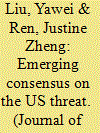| Srl | Item |
| 1 |
ID:
089015


|
|
|
|
|
| Publication |
2009.
|
| Summary/Abstract |
This study searches for consensus findings in the burgeoning statistical literature on civil war termination. Several trends are identified: the final outcomes of civil wars are largely dependent on the military situation; the duration of civil wars, by contrast, depends to a great degree on contextual factors such as inter-ethnic relations, the fragmentation of violence, and economic incentives; while compromise settlements reduce the risk of post-war massacres, they take longer to achieve than military victories and are more likely to collapse into renewed warfare. These results also suggest an intervener's dilemma: while external military intervention can lead to compromise and prevent genocide, it also prolongs the killing and may increase the risk of war recurrence. Interveners appear to have more success after wars than during them. Several other puzzles emerge from the statistical results, which call for theoretical development and further qualitative and quantitative analysis.
|
|
|
|
|
|
|
|
|
|
|
|
|
|
|
|
| 2 |
ID:
128273


|
|
|
|
|
| Publication |
2014.
|
| Summary/Abstract |
Though the PLA elite perceptions of the United States have fluctuated over time, there has been some regularity in the evolution of their perceptions. Comparing the dominant perceptions of the United States among different generations of Chinese military elites in the PRC, we find that the PLA elite perceptions of US intentions have been foremost influenced by China's strategic interest in a certain period, rather than the level and intensity of bilateral exchanges at the time. Using the case of US arms sales to Taiwan and the case of the South China Sea and the Diaoyu Islands, we try to assess how consistent and persistent PLA elite perceptions of the US have been in recent years. While we agree that these outspoken military men cannot be taken on the surface as indicative of China's national policies, we will also point out several important dimensions that are likely to allow the PLA to play a more influential role in setting the agenda for China's strategic interest in the era of Xi Jinping.
|
|
|
|
|
|
|
|
|
|
|
|
|
|
|
|